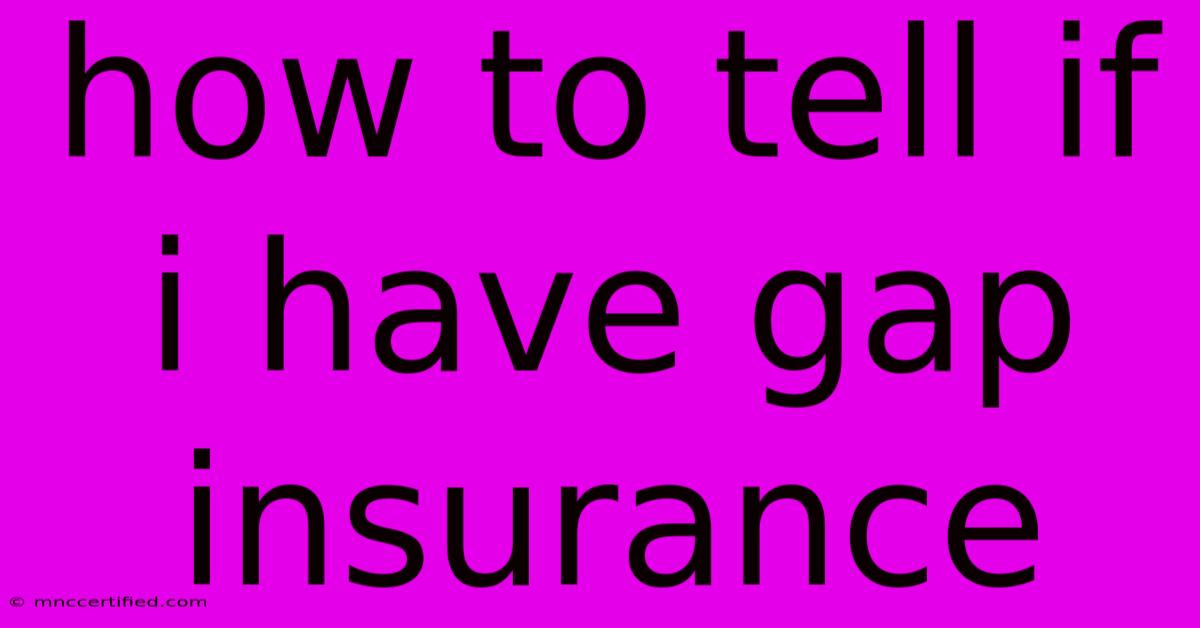How To Tell If I Have Gap Insurance

Table of Contents
How to Tell If You Have Gap Insurance: A Simple Guide to Protecting Yourself
Have you ever wondered if you have gap insurance? It's a crucial coverage that can save you thousands of dollars if your vehicle is totaled in an accident. But how do you know if you're actually covered? This guide will walk you through the simple steps to find out if you have gap insurance and how to obtain it if you need it.
What is Gap Insurance?
Gap insurance bridges the difference between what your car is worth and what you owe on your auto loan. Here's why it's essential:
- Depreciation: Your car loses value the moment you drive it off the lot. Even if you have full coverage insurance, you might not get enough from your insurer to cover your outstanding loan balance if your car is totaled.
- Loan Balances: You may still owe more on your car loan than the vehicle is worth, especially during the first few years of ownership.
Without gap insurance, you'd be responsible for paying the remaining balance out of pocket, which can be a substantial financial burden.
How to Determine if You Have Gap Insurance:
- Check Your Insurance Policy: Your insurance policy should clearly state whether you have gap coverage. Look for a section specifically addressing "gap insurance," "loan/lease gap," or "negative equity coverage."
- Review Your Auto Loan Documents: Your auto loan agreement or disclosure may mention if gap insurance was included in the financing.
- Contact Your Insurance Company: If you're unsure, call your insurance agent or company directly. They can quickly verify if you have gap coverage and provide you with details about your policy.
- Look for a Gap Insurance Certificate: You might have received a separate certificate of insurance for your gap coverage. Check your insurance paperwork or contact your insurer for a copy.
What if I Don't Have Gap Insurance?
If you find out you don't have gap insurance, don't worry! You can still obtain it:
- Through Your Car Dealer: Many dealerships offer gap insurance when you purchase or lease a new car.
- From Your Auto Lender: Your lender may also offer gap insurance options, though they could have higher premiums.
- Through Your Insurance Company: Most insurance companies sell gap coverage as an optional add-on to your existing auto insurance policy.
Key Considerations When Choosing Gap Insurance:
- Cost: Gap insurance premiums vary based on factors like your car's value, your loan amount, and your driving record.
- Coverage Limits: Understand the specific amount of coverage and any limitations in your policy.
- Deductibles: Some gap insurance policies have deductibles, so make sure you understand what you'll be responsible for paying in the event of a claim.
Don't Be Caught Unprepared:
Knowing whether you have gap insurance can protect your finances in the unfortunate event of a car accident. By taking these simple steps, you can be confident that you're properly protected and have peace of mind on the road.

Thank you for visiting our website wich cover about How To Tell If I Have Gap Insurance. We hope the information provided has been useful to you. Feel free to contact us if you have any questions or need further assistance. See you next time and dont miss to bookmark.
Featured Posts
-
Costco Butter Recall Allergen Warning
Nov 13, 2024
-
Naic Number For Fred Loya Insurance
Nov 13, 2024
-
Trump Seeks Musk Ramaswamy For Government Cuts
Nov 13, 2024
-
Dwts Season 33 Week 7 Elimination Revealed
Nov 13, 2024
-
Green Day Sleep Token Korn Lead Download Festival Lineup
Nov 13, 2024